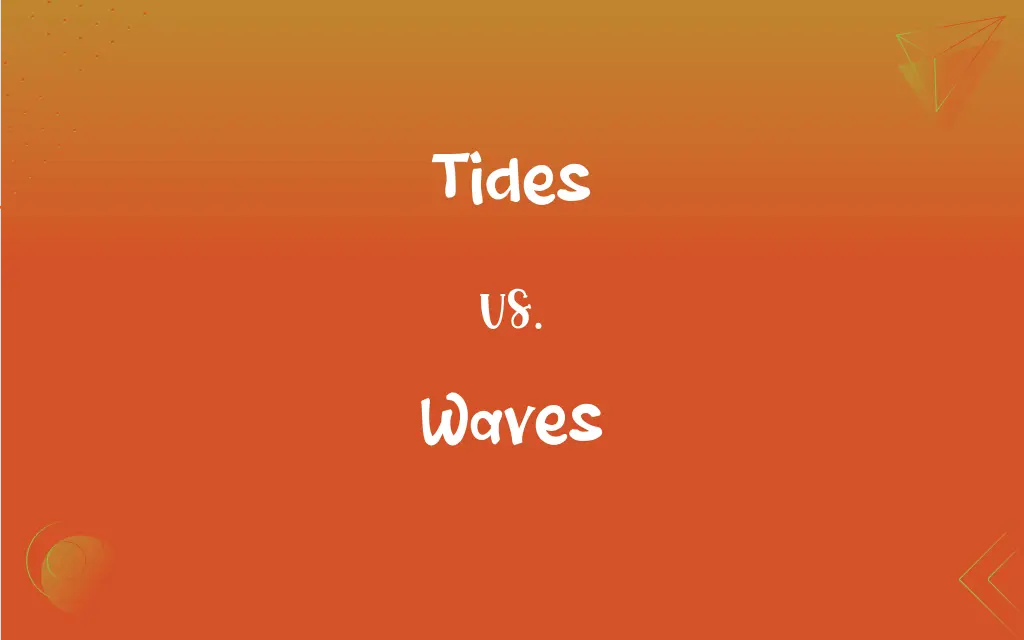Tides vs. Waves: What's the Difference?
Edited by Aimie Carlson || By Janet White || Published on November 30, 2023
Tides are the regular rise and fall of sea levels caused by the gravitational forces of the moon and sun, while waves are caused by the wind transferring energy to the water's surface.

Key Differences
Tides are large-scale phenomena that occur in predictable patterns, influenced mainly by the moon's and sun's gravitational pull. While, waves are more irregular, caused by wind blowing over the surface of the sea or ocean.
The movement of tides involves the entire water body rising and falling, affecting coastal areas globally. Waves, however, are surface movements and can vary greatly in size, from small ripples to giant waves.
Tides cycle typically over a 24-hour period, with two high tides and two low tides each day. Whereas, waves can occur at any time, influenced by local wind conditions and other factors.
The impact of tides is crucial for marine navigation and coastal ecosystems, influencing activities like fishing and boating. Meanwhile, waves primarily affect surface conditions and are significant for activities like surfing and sailing.
Tides are predictable and calculated in advance, with tide tables available for most coastal regions. In contrast, waves are less predictable, varying with weather patterns and local topography.
ADVERTISEMENT
Comparison Chart
Cause
Gravitational pull of moon and sun
Wind blowing over water's surface
Scale
Large-scale, entire water body movement
Surface movement, varying sizes
Predictability
Highly predictable
Less predictable, varies with conditions
Frequency
Regular cycles (typically daily)
Occur anytime, dependent on wind
Impact
Affects coastlines and marine navigation
Affects surface conditions, recreational activities
ADVERTISEMENT
Tides and Waves Definitions
Tides
The alternating rise and fall of sea levels occurring daily.
Tides affect the depth of water in the harbor.
Waves
Ripples or undulations on the water's surface caused by wind.
The wind created gentle waves on the lake.
Tides
The periodic rise and fall of sea levels caused by gravitational forces.
The fisherman planned his trip according to the high tide.
Waves
The movement of water formed by wind or seismic activity.
Surfers look for the perfect waves to ride.
Tides
The regular movement of the ocean caused by the moon and sun's gravity.
The coastal town prepared for the spring tides.
Waves
Oscillations that travel through water with energy.
The storm at sea caused large, powerful waves.
Tides
The natural, rhythmic movement of ocean water.
Marine animals' behavior is often influenced by the tides.
Waves
The upward and downward movement of water on the surface.
Children enjoyed jumping over the small waves at the beach.
Tides
The vertical movement of water in the earth's oceans.
Tides play a crucial role in coastal ecosystems.
Waves
The undulating movement of water in oceans, seas, or lakes.
The boat bobbed up and down on the waves.
Tides
The periodic variation in the surface level of the oceans and of bays, gulfs, inlets, and estuaries, caused by gravitational attraction of the moon and sun.
Waves
Plural of wave
Tides
A specific occurrence of such a variation
Awaiting the next high tide.
FAQs
Are tides predictable?
Yes, tides are highly predictable and follow regular patterns.
Are tides important for marine life?
Yes, tides are crucial for many aspects of marine ecosystems.
Do tides affect rivers?
Yes, tides can affect estuarine and riverine environments.
Can waves be predicted?
Waves are less predictable and can vary with weather and local conditions.
Do waves occur in patterns?
Waves don't follow a regular pattern like tides and can be quite random.
Are all waves caused by wind?
Most waves are wind-generated, but some can also be caused by seismic activity.
What causes waves?
Waves are primarily caused by wind blowing over the surface of the water.
What primarily causes tides?
The gravitational pull of the moon and the sun.
Can tides vary in height?
Yes, the height of tides can vary depending on the location and time of year.
How do tides affect beaches?
Tides can lead to changes in beach profiles and sediment distribution.
Can waves affect coastal erosion?
Yes, waves play a significant role in shaping and eroding coastlines.
How often do tides occur?
Tides typically occur twice a day, with two high tides and two low tides.
Can tides influence navigation?
Yes, tides are crucial for navigation, particularly in coastal waters.
Do tides have the same height every day?
No, tidal ranges can vary daily and are influenced by the lunar cycle.
Do waves always move towards the shore?
Generally, but wave direction can be influenced by local topography and wind direction.
Can tides cause flooding?
Yes, particularly high tides can contribute to coastal flooding.
Can tides generate energy?
Yes, tidal movements are used in some places to generate renewable energy.
Are waves used for recreational activities?
Yes, waves are popular for activities like surfing and sailing.
Are waves important for marine ecosystems?
Waves can influence marine ecosystems, particularly in coastal areas.
Can tides be used to predict fish behavior?
Yes, many fishing practices are influenced by tidal patterns.
About Author
Written by
Janet WhiteJanet White has been an esteemed writer and blogger for Difference Wiki. Holding a Master's degree in Science and Medical Journalism from the prestigious Boston University, she has consistently demonstrated her expertise and passion for her field. When she's not immersed in her work, Janet relishes her time exercising, delving into a good book, and cherishing moments with friends and family.
Edited by
Aimie CarlsonAimie Carlson, holding a master's degree in English literature, is a fervent English language enthusiast. She lends her writing talents to Difference Wiki, a prominent website that specializes in comparisons, offering readers insightful analyses that both captivate and inform.






































































